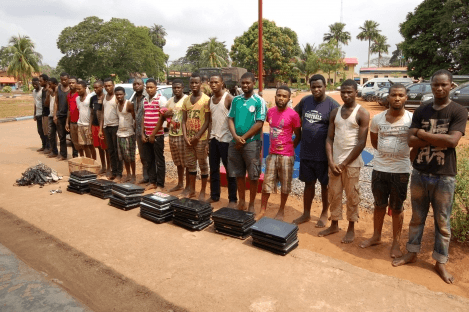In Nigeria, a troubling cycle of government-induced poverty and escalating crime rates has emerged, perpetuating a cycle of despair and instability. While the country boasts vast resources and a burgeoning economy, mismanagement, corruption, and inadequate social policies have left many Nigerians impoverished. As poverty deepens, crime rates surge.
Despite being Africa’s largest oil producer, the benefits of this resource wealth have not trickled down to the masses. Rampant corruption siphons off public funds for infrastructure, education, and healthcare, leaving citizens without essential services.
The lack of investment in human capital exacerbates poverty, depriving individuals of opportunities for upward mobility.
Inadequate social safety nets worsen the plight of the poor, pushing many into desperation. With limited access to education and job opportunities, young people, in particular, find themselves susceptible to the allure of criminal activities.

Unemployment rates remain stubbornly high, fueling frustration and disillusionment among the youth who see few prospects for a better future.
The absence of effective law enforcement and judicial systems further compounds the problem. Weak institutions fail to deter criminal behavior or hold perpetrators accountable, emboldening criminal elements to operate with impunity.
As crime rates soar, citizens lose faith in the ability of the state to provide security and justice, leading to further instability.
Moreover, the relationship between poverty and crime creates a vicious cycle that is difficult to break.
High crime rates deter investment and economic growth, perpetuating poverty and exacerbating social inequality. In turn, poverty fuels desperation and crime, creating a self-reinforcing cycle of deprivation and lawlessness.
Nigeria must address the root causes of poverty and crime to break this cycle through comprehensive reforms. This includes tackling corruption head-on, strengthening institutions, and promoting inclusive economic growth.

Investment in education, vocational training, and job creation programs is essential to provide opportunities for the youth and lift communities out of poverty.
Additionally, robust law enforcement and judicial reforms are necessary to restore trust in the justice system and deter criminal behavior.
This entails improving police training, enhancing forensic capabilities, and promoting transparency and accountability within the judiciary.
Furthermore, social safety nets must be expanded to provide assistance to the most vulnerable segments of society, ensuring that no one is left behind. By addressing the structural drivers of poverty and crime, Nigeria can pave the way for a more prosperous and secure future for all its citizens.




